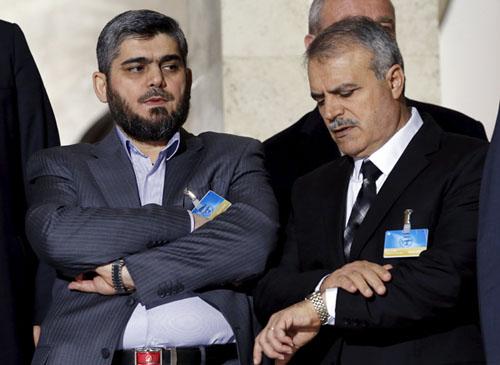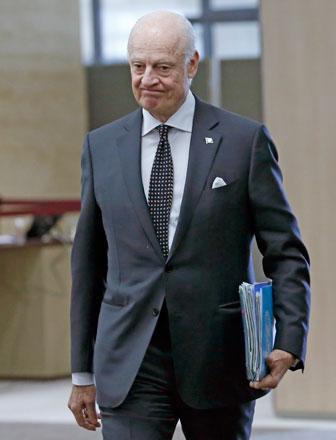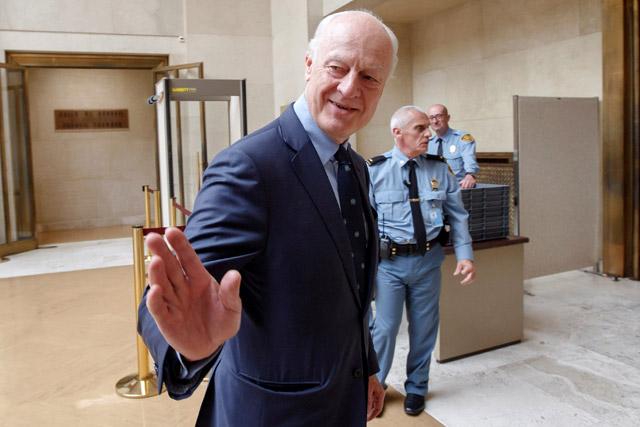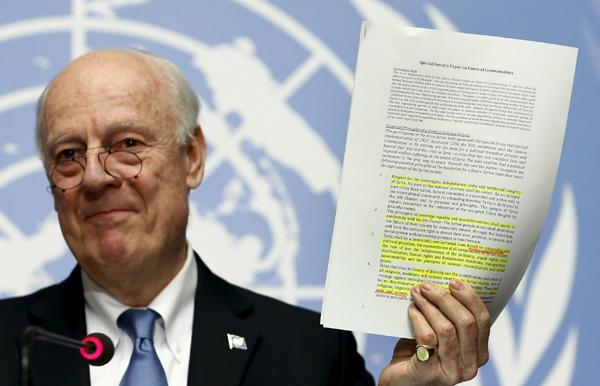You are here
Syria peace talks grind towards pivotal Assad question
By Reuters - Mar 20,2016 - Last updated at Mar 20,2016

In this March 15, 2016 file photo, Asaad Al Zoubi (right) of the High Negotiations Committee looks at his watch next to Mohamed Alloush of the Jaysh Al Islam during a news conference after a meeting with UN mediator for Syria Staffan de Mistura during Syria peace talks at the United Nations in Geneva, Switzerland (Reuters photo)
GENEVA — Syrian government negotiators at Geneva peace talks are coming under unaccustomed pressure to discuss something far outside their comfort zone: the fate of President Bashar Assad. And they are doing their best to avoid it.
UN mediator Staffan de Mistura describes Syria's political transition as "the mother of all issues" and, emboldened by the Russian and US muscle that brought the participants to the negotiating table, he refuses to drop the subject.
After a week of talks in Geneva, he praised the opposition for the depth of their ideas, but criticised the veteran diplomats on the government side for getting bogged down.
"The government is currently focusing very much on principles, which are necessary in any type of common ground on the transition," he said. "But I hope next week, and I have been saying so to them, that we will get their opinion, their details on how they see the political transition taking place."
Arguments over Assad's fate were a major cause of the failure of previous UN peace efforts in 2012 and 2014 to end a civil war that has now lasted five years, killed more than 250,000 people and caused a refugee crisis.
The main opposition, along with the United States and other Western nations, has long insisted any peace deal must include his departure from power, while the Syrian government and Russia have said there is no such clause in the international agreements that underwrite the peace process.
The Syrian president looked more secure than ever at the start of the latest round of talks, riding high after a Russian-backed military campaign.
But Russia's surprise withdrawal of most of its forces during the week signalled that Moscow expected its Syrian allies to take the Geneva talks seriously. And de Mistura appointed a Russian expert to sit in the negotiations with him and to advise on political issues.
Unlike previous rounds, the talks have run for a week without any hint of collapse, forcing the government delegation led by Syria's UN Ambassador Bashar Jaafari to acknowledge de Mistura's demands.
Jaafari began by giving de Mistura a document entitled "Basic elements for a political solution".
"Approving these principles will open a serious dialogue under Syrian leadership without foreign intervention and without preconditions," Jaafari said on Friday, in a brief statement after the longest session of the talks so far.
But officials and diplomats involved in the talks variously described the document as "very thin", "bland" and "off the point".
It listed familiar goals such as maintaining a secular state and Syria's territorial integrity and the importance of fighting terrorism, according to sources who have read it. But it said nothing about a political transition.
Filibuster
In sessions with de Mistura, Jaafari has approached the negotiations as slowly as possible, reopening UN resolutions and going through them "by the letter", said a source with knowledge of the process.
"Mr Jaafari is still in a kind of delusion of trying to filibuster his way out of town, or to filibuster the opposition out of town," said a western diplomat.
"He will spend every minute questioning the nature of the opposition, quibbling about the font in the agenda."
By Friday, de Mistura said Jaafari's team needed to go faster and couldn't avoid the substantive question forever.
"The fact that the government delegation would like to set different rules or play with the terms of this agreement is I think a non-starter," said opposition delegate Basma Kodmani.
A diplomat involved in the peace process said Assad was not used to having to compromise, and that made Jaafari's negotiating position rigid.
"He has to have control. If he gives up 1 per cent, he loses 100 per cent. He's designed like that," the diplomat said.
In three meetings with each side during the week, de Mistura quizzed the negotiators about their ideas, and they were also able to put questions to their rivals through him, one participant said.
The UN mediation team spends the sessions "stripping the papers apart and delving deep into the subject and forcing them to do more homework and forcing them to give answers", said a source with knowledge of the process.
The negotiators do not meet each other, but face de Mistura in a functional, windowless room with desks arranged in a square. There is space for eight or nine people around each side, but the conditions are slightly cramped, and afford no luxury beyond a plastic bottle of mineral water on each desk.
"De Mistura is dragging the regime in with his queries on their position paper, rather than allowing them to talk about what they want," said the diplomat involved in the peace process.
"The regime had in the past a bit of space to play and to manoeuvre," he said. "The regime knows it has to come and stay but is not prepared for the idea that it has to engage the opposition."
Related Articles
GENEVA — The UN special envoy on Syria said he hoped a meeting between the US and Russian foreign ministers on Wednesday would give impetus
GENEVA — In the first concrete results from talks this week on ending Syria's conflict, the United Nations said on Thursday the warring side
GENEVA — The United Nations said on Thursday it would tackle the divisive issue of a transition in Syria when warring parties meet again nex



















